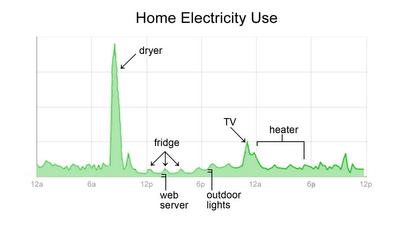Google PowerMeter
Imagine how hard it would be to stick to a budget in a store with no prices. Well, that's pretty much how we buy electricity today. Your utility company sends you a bill at the end of the month with very few details. Most people don't know how much electricity their appliances use, where in the house they are wasting electricity, or how much the bill might go up during different seasons. But in a world where everyone had a detailed understanding of their home energy use, we could find all sorts of ways to save energy and lower electricity bills. In fact, studies show that access to home energy information results in savings between 5-15% on monthly electricity bills. It may not sound like much, but if half of America's households cut their energy demand by 10 percent, it would be the equivalent of taking eight million cars off the road.I am a big fan of smart meters and am glad to see Google getting involved. This will bring much needed attention to this sector which hopefully will stimulate the entire smart grid and smart meter market. I agree that if people can see where they are using electricity, it makes it easy to reduce while maintaining their current lifestyle. While I like what they are doing with the Google PowerMeter project, I think the bottleneck to smart meter adaption is not low quality software but rather the cost and hassle of getting the hardware to every customer.
Google’s mission is to "organize the world’s information and make it universally accessible and useful," and we believe consumers have a right to detailed information about their home electricity use. We're tackling the challenge on several fronts, from policy advocacy to developing consumer tools, and even investing in smart grid companies. We've been participating in the dialogue in Washington, DC and with public agencies in the U.S. and other parts of the world to advocate for investment in the building of a "smart grid," to bring our 1950s-era electricity grid into the digital age. Specifically, to provide both consumers and utilities with real-time energy information, homes must be equipped with advanced energy meters called "smart meters." There are currently about 40 million smart meters in use worldwide, with plans to add another 100 million in the next few years.
In addition to policy advocacy, we're building consumer tools, too. Over the last several months, our engineers have developed a software tool called Google PowerMeter, which will show consumers their home energy information almost in real time, right on their computer.
Check out this short video overview of the project:
via Google Blog via Earth2Tech and TechCrunch






No comments:
Post a Comment
Note: Only a member of this blog may post a comment.